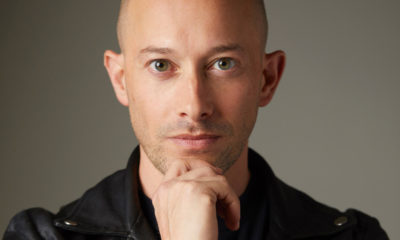
Lifestyle

SA’s problems need smart innovation, says Israeli expert
Israel is a master at innovation because it deals with its own problems by finding smart solutions, says Aharon Aharon, the former chief executive of the Israel Innovation Authority, who was in South Africa last week.
“South Africa could certainly learn from this,” he told the SA Jewish Report in Johannesburg. “This country needs to look at what problems it has and find innovative solutions to them. That way, you solve problems, increase productivity in the country, and employ people in the process.”
Aharon said this was what he told South African minister of sport, arts and culture, Gayton McKenzie, when he met him last week. Aharon also gladly acceded to the minister’s request for him to return to South Africa to help come up with innovative ideas.
“I haven’t tried to understand what South Africa would need solving, but I’m happy to help,” he said. Aharon, who was brought to South Africa by the Israeli consulate, said he was astonished to learn from the minister that South Africa had such a massive unemployment problem.
“It’s essential to find innovative ways to sort this out, and it’s the need that leads to innovation, not the other way around. And innovation isn’t always about technology, although that’s what people assume.”
To this end, he recalls that when Israel got independence in 1948, the population doubled in 18 months. “We had no energy to supply homes, and the electric boiler and fridge were major consumers, which was problematic. So, our solution was to bring solar to homes,” he said. “It has since become mandatory for all homes in Israel to be equipped with solar energy. This isn’t sophisticated technology, but it fulfilled a real need.”
Aharon spoke of another simple Israeli innovation called drip irrigation that emerged out of necessity. In this case, water and nutrients are dripped onto each specific plant growing. “We had a lot of desert, no water, and a huge need for agriculture, and this innovation has changed Israel,” Aharon said.
Israel no longer has a water problem because it has mastered wastewater reclamation and water desalination. “As much as 86% of our water – which we can drink and use for agriculture – is reclaimed from sewerage water. We also desalinate sea water for drinking.”
Aharon said Israel’s innovative strength was historic. “Looking back at our past, Jews weren’t very accepted in the countries we lived in. We had to have something that didn’t tie us to a specific place, and the only thing we could take with us wherever we went was our brain,” said Aharon.
“When Theodor Herzl spoke of the Jewish nation in 1896, he talked about using technology and innovation,” said Aharon. “He spoke of the use of research to enable the country to flourish and with the use of science, nothing is impossible.”
Herzl’s dream was put in place, according to Aharon, even before the state of Israel was established. Aharon pointed out that Haifa Technion, Israel’s Institute of Technology, was founded in 1924, Hebrew University in Jerusalem started in 1925, and the Weizmann Institute of Science was launched in 1934. “All three of these are listed in the top 100 universities. So there was no surprise when Prime Minister David Ben-Gurion spoke out about the vital role of science and technology in Israel’s development.”
Role models in the country have also changed because of this, he said. “Twenty years ago, Jewish mothers wanted their sons to be doctors, but today, they dream of their children succeeding in high tech,” he said, admitting that his two daughters, two sons-in-law, and his son all work in high tech in Israel.
This industry has made a major impact on the Israeli economy, with start-ups being sold for huge amounts of money.
Just this month, Aharon said, the biggest cyber buyouts ever took place, with Google buying Israeli cloud security innovation company, Wiz, for $32 billion (R587 billion). “While everyone was talking about that deal, they neglected to mention the acquisition that took place eight days earlier for NeXT – an insurance technology company – at $2.6 billion (R47.7 billion),” he said.
In 2024, Israel sold technology companies to internationals for about $12 billion (R220.1 billion) and in the first three months of 2025, the figure was more than $35.6 billion (R653 billion), according to Aharon.
Though there are many innovations that those wanting to boycott Israel would have to do without, grapes aren’t something that comes to mind, said Aharon.
But years back, South Africa was battling to grow “strong and juicy” grapes, and it found a solution at the Volcani Institute, Israel’s agricultural research organisation. “Today, most of the grapes grown in South Africa had their origins in Israel. So, Israel imports South African grapes in winter, and the royalties of that goes to the Israeli government.”
And almost everything related to the internet or cyberspace comes from Israel, Aharon says. “Israel is the number-one exporter of cyber worldwide. There are so many things you wouldn’t even think of that have parts that come from Israel, especially in terms of cybersecurity.”
Aharon said that though his wife had worked in South Africa years ago, he had never been here before. He was pleased, however, that while he understood the government here didn’t like Israel, he hadn’t seen or experienced this sentiment on the streets.
He found it astonishing that the South African government was spending so much money on taking Israel to the International Court of Justice at The Hague when it hadn’t yet sorted out its own problems like unemployment.
“Why is the South African government focusing on a country it has no interest in? Does it have any impact on South Africa? Does it solve any problems for South Africa? Yet they are using taxpayers’ money for this. Why?”
Though it doesn’t make sense to him, he said he believed that “if people really talked to each other and didn’t avoid each other, the problems could be sorted. It’s a problem between two governments, not two nations.”
To the SA Jewish community, he said, “This issue between the government and Jews isn’t positive, but it can make the community that much closer and stronger.
“We should take advantage of this, and it should strengthen the relationship between local Jews and Israel too.”










